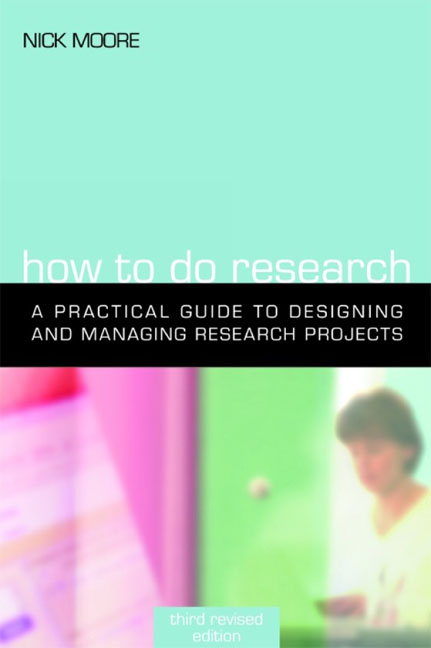Book contents
- Frontmatter
- Contents
- Acknowledgements
- Introduction: Types of research
- Part 1 The research process
- Part 2 Methods
- 9 Introducing research methods
- 10 Desk research
- 11 Analysing desk research
- 12 Collecting quantitative data
- 13 Analysing quantitative data
- 14 Collecting qualitative data
- 15 Analysing qualitative data
- 16 Sources of further reading
- Appendix The market for information professionals: A proposal from the Policy Studies Institute
- Index
11 - Analysing desk research
from Part 2 - Methods
Published online by Cambridge University Press: 09 June 2018
- Frontmatter
- Contents
- Acknowledgements
- Introduction: Types of research
- Part 1 The research process
- Part 2 Methods
- 9 Introducing research methods
- 10 Desk research
- 11 Analysing desk research
- 12 Collecting quantitative data
- 13 Analysing quantitative data
- 14 Collecting qualitative data
- 15 Analysing qualitative data
- 16 Sources of further reading
- Appendix The market for information professionals: A proposal from the Policy Studies Institute
- Index
Summary
Desk research can call for quantitative or qualitative approaches to analysis. Clearly, if you are embarking on the secondary analysis of data, then you will need to follow the same kind of approach that you would if you had collected the data yourself.
If, on the other hand, you are analysing the results of a literature or internet search or you are conducting a review of research, you will need to adopt approaches that draw heavily on qualitative research.
Common principles
There are, however, some principles that are common to the analysis of all desk research.
Authority and reliability
You need to begin by questioning the authority and reliability of the material you are working with. If you have collected the data yourself you will have a reasonable idea of the amount of trust you can place in it. If someone else has compiled the data then you need to look fairly carefully at how they did it.
You need to look at sample sizes and the basis for drawing the samples. You should, if you can, look at the data collection tools used – the questionnaires, interview schedules and so on. You should give some thought to the people who conducted the research – how much experience do they have, are they known to you, would you trust them? Clearly, data produced from one of the regular government social surveys will have a different standing from that produced as part of an independent study carried out by an unknown research team.
If you are dealing with published material, what authority does the publisher bring to the party? What steps will they have taken to ensure that the research is worth publishing? Similar questions could be applied to the research sponsor.
Be clear about what you are looking for
A structured approach to the material you have to work with is much more likely to bear fruit. Work out in advance what it is that you are interested in. At first you may only have a broad idea derived from your project aim and objectives. As you work through the material, develop a more refined set of issues and questions that you want to explore. At any stage in the process you should be able to state quite clearly what it is that you are looking for in your material.
- Type
- Chapter
- Information
- How to Do ResearchA practical guide to designing and managing research projects, pp. 112 - 114Publisher: FacetPrint publication year: 2006



